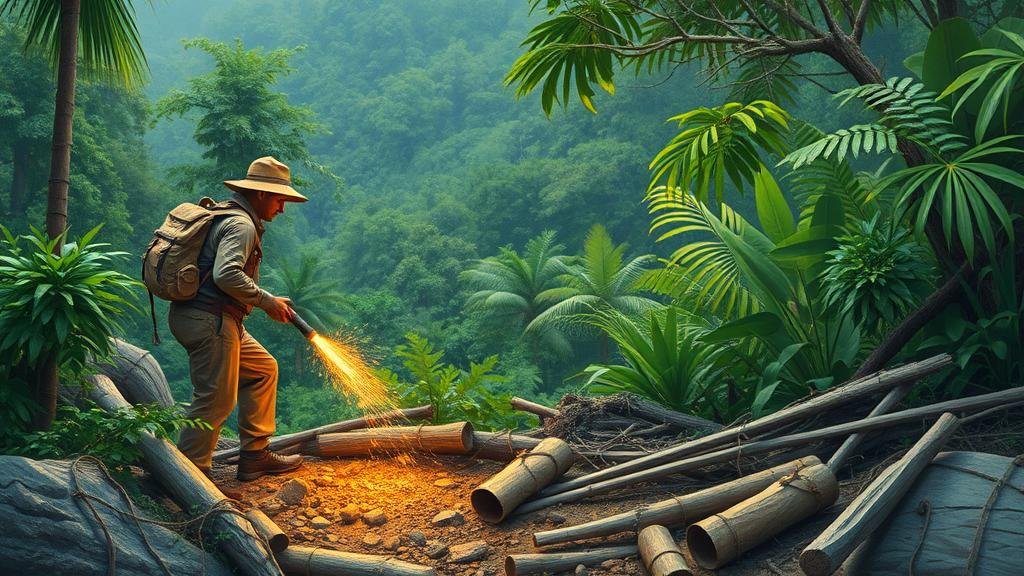Remote Jungle Expeditions: The Thrill and Challenges of Gold Prospecting
Remote Jungle Expeditions: The Thrill and Challenges of Gold Prospecting for Rockhounds and Mineral Collectors
Gold prospecting in remote jungles has become a captivating adventure for rockhounds and mineral collectors alike. With the promise of uncovering precious minerals in untouched areas, these expeditions can be both exhilarating and fraught with challenges. This article explores the intricacies of jungle gold prospecting, the tools needed, the potential risks involved, and practical tips for those eager to embark on such an adventure.
The Allure of Gold Prospecting
Gold has been a symbol of wealth and power for centuries. Its scarcity and aesthetic appeal make it a sought-after treasure. According to the United States Geological Survey (USGS), about 244,000 metric tons of gold have been mined throughout history, and it is estimated that around 50% of the world’s gold reserves are still undiscovered. This fact fuels the desire for amateur and professional prospectors alike to search in remote areas that have not been fully explored.
The Journey into the Jungle
Traveling to remote jungle regions requires significant planning and preparation. following considerations are crucial for a successful expedition:
- Destination Selection: Choose areas with a known history of gold deposits, such as the Amazon Basin or regions in Southeast Asia.
- Permissions and Regulations: Research and obtain necessary permits to legally prospect in these areas, as some places have strict environmental protections.
- Logistics: Plan your route and means of transportation, considering the need for helicopters, boats, or trekking through rough terrain.
Essential Tools for Gold Prospecting
Equipping yourself with the right tools is vital for successful prospecting. Essential gear includes:
- Panning Equipment: A pan, classifier, and shovel are fundamental for separating gold from sediment.
- Metal Detectors: Handheld metal detectors can help locate nuggets buried under soil or vegetation.
- GPS Devices: Use GPS technology for navigation and to mark significant find locations.
- Sampling Tools: Rock hammers and chisels are necessary for breaking apart rocks in search of veins.
Challenges of Jungle Prospecting
While the opportunities to find gold are enticing, prospectors must navigate various challenges:
- Environmental Hazards: From unpredictable weather patterns to wildlife encounters, the jungle can present physical dangers. Research and take precautions against snakes, insects, and potential flooding.
- Access to Clean Water: Staying hydrated is essential. Carry purification tablets or portable filters to ensure safe drinking water.
- Physical Demands: The physical requirements of trekking through dense jungle can be taxing. Its vital to prepare through fitness training before embarking on the expedition.
Real-World Applications of Mineral Collecting
For many mineral collectors, the experience of prospecting extends beyond simply seeking gold. Collectors often seek a deeper understanding of geology and the broader ecosystem in which mineral deposits occur. Engaging in responsible collecting helps foster an appreciation for nature and conservation.
Also, gold prospectors contribute to local economies by potentially creating jobs in tourism and education about mineral recovery. Collaborating with local communities can enhance sustainable practices and reduce environmental impacts.
Actionable Takeaways
Embarking on a remote jungle expedition for gold prospecting can be thrilling and fulfilling. Here are actionable steps for aspiring rockhounds and mineral collectors:
- Conduct thorough research on the destination to understand the geology and mineral potential.
- Build a comprehensive prospecting kit tailored to the jungle environment.
- Prepare physically and mentally for the demands of jungle trekking.
- Engage with local experts and communities to foster responsible prospecting practices.
As you dream of uncovering gold treasures, remember that knowledge, preparation, and respect for nature are paramount for a rewarding expedition.


